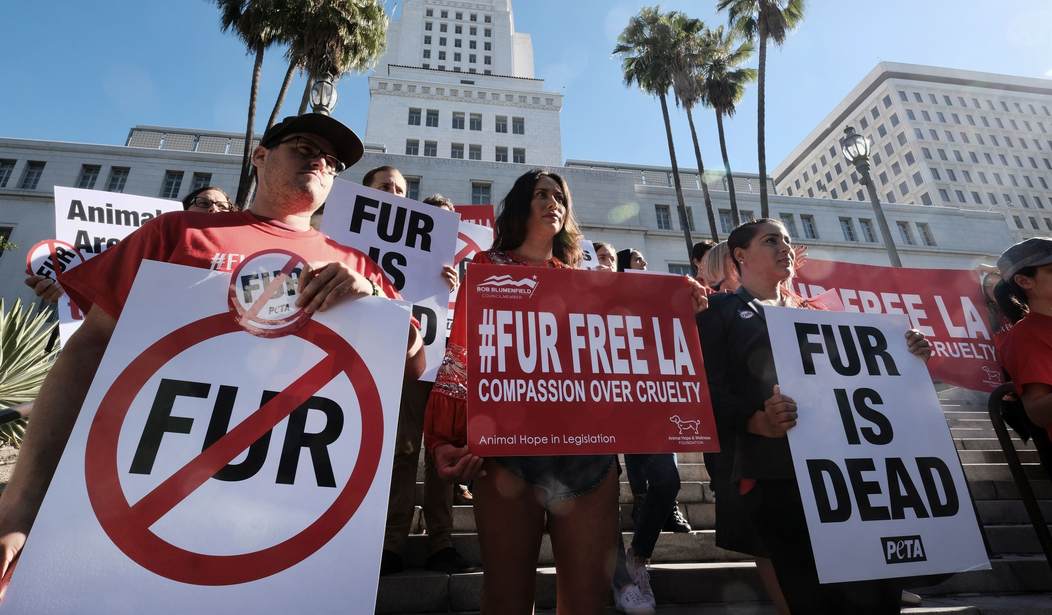Thanksgiving is less than a month away, which means that the public will once again be subject to vegan schoolmarming from the People for Ethical Treatment of Animals (PETA). After all, would it really be Thanksgiving without these people showing up to badger us into foregoing our customary turkey dinner?
PETA plans to bring its “Hell on Wheels” turkey transport truck to Bristol Farms in Santa Barbara, California. The vehicle is covered with pictures of turkeys stuffed into crates. It will blare out recorded sounds of turkey’s cries when they are slaughtered for human consumption, according to a press release.
The truck will “bombard” shoppers with “subliminal messages every 10 seconds suggesting that people go vegan” as part of a 30-state tour to “raise awareness of the 46 million turkeys who are killed every year for Thanksgiving.”
The organization, which seeks to force everyone to embrace a vegan diet, brings up these concerns amid the bird flu outbreak that “continues to spread across the U.S.A.”
PETA claims that “breeding and raising animals for food creates hotspots for potentially deadly zoonotic diseases.”
Of course, the organization also makes the typical argument that “Behind every trussed-up turkey is a once-living, sensitive individual who was crammed onto a truck for a terrifying, miserable journey to their death,” according to PETA Executive Vice President Tracy Reiman.
Yet, for all its caterwauling about the cruelty of those who refrain from only eating plants (which are also living beings), the organization’s history suggests that it is not as passionate about saving animals as it would have us believe.
PETA reportedly euthanized more than 84 percent of animals brought into its shelters in 2011. It has often been criticized for killing animals that could have been adopted, which calls into question its supposed commitment to “animal welfare.”
In 2011, People for the Ethical Treatment of Animals (PETA) behaved in a regrettably consistent manner: it euthanized the overwhelming majority (PDF) of dogs and cats that it accepted into its shelters.
Out of 760 dogs impounded, they killed 713, arranged for 19 to be adopted, and farmed out 36 to other shelters (not necessarily "no kill" ones). As for cats, they impounded 1,211, euthanized 1,198, transferred eight, and found homes for a grand total of five. PETA also took in 58 other companion animals -- including rabbits. It killed 54 of them.
These figures don't reflect well on an organization dedicated to the cause of animal rights.
Even acknowledging that PETA sterilized over 10,500 dogs and cats and returned them to their owners, it doesn't change the fact that its adoption rate in 2011 was 2.5 percent for dogs and 0.4 for cats.
Even acknowleding that PETA never turns an animal away -- "the sick, the scarred and broken, the elderly, the aggressive and unsocialized..." -- doesn't change the fact that Virginia animal shelters as a whole had a much lower kill rate of 44 percent.
And even acknowledging that PETA is often the first to rescue pets when heat waves and hurricanes hit, that doesn't change the fact that, at one of its shelters, it kills 84 percent of supposedly "unadoptable" animals within 24 hours of their arrival.
The organization has also been criticized for its bizarre advertising campaigns. For example, it has used Holocaust imagery in ads comparing animal farming to concentration camps. Apparently, the group agrees with Hitler’s view that Jews and others who perished in these camps are akin to animals.
PETA has also not hesitated to use horrifying events such as murder, cannibalism, and even the Holocaust in their ads — which has angered many people, especially members of the Jewish community. The European Courts of Human Rights has banned PETA from using Holocaust imagery in their advertisements.
They have also used misleading campaigns more than once, leaving most animal rights activists (even vegans) feeling “disgust and anger” at the organization. A good example is the anti-shear campaign which PETA recently pushed, which used a bloody but fake lamb mannequin to send a bloody and also fake message.
PETA’s antics are well known on social media and in the real world. The “Hell on Wheels” tour, like most of its messaging, is far more likely to turn people off to their movement than to attract new converts.














Join the conversation as a VIP Member